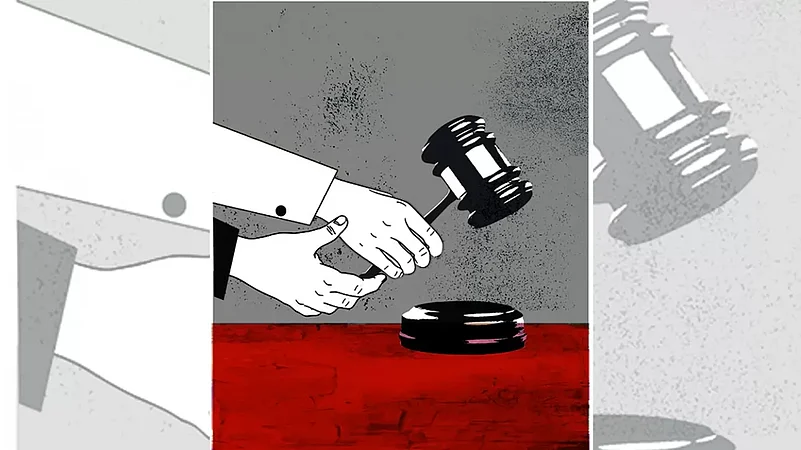The Indian Executive is in a unfortunate confrontation with the Judiciary, with Union Law Minister Kiren Rijiju leading the attack on the Collegium system. While the government has been accused of sitting on the Collegium’s recommendations, Rijiju has claimed that the judges spend half their time in deciding whom to appoint. His televised statements against the Judiciary have seen raised voices not only from the top court but also from the opposition parties.
Dubbing Rijiju’s comments and the present government’s attitude as “irresponsible” and “injudicious”, former law minister and veteran Congress leader Veerappa Moily says that the law minister should respect the high office he holds.
“The Union law minister is the face of the executive in front of the Legislature and the Judiciary. He is not just accountable to the Parliament but also to the judiciary,” Moily tells Outlook. He adds, “The law minister is a constitutional person who not only represents the letter of the Constitution but also the constitutional spirit. Such attacks on the Judiciary do not bode well for the people of a democracy and do not reflect well on India at an international level.”
In 2014, the BJP government at the Centre passed the National Judicial Appointments Commission (NJAC) Act along with the 99th Constitutional Amendment Act. The NJAC Act allowed the Parliament to regulate the functions of the National Judicial Appointments Commission, the proposed body responsible for the recruitment, appointment and transfer of judicial officers, legal officers and legal employees under the government of India and all state governments across the country.
Incidentally, the NJAC Bill was first moved during Moily’s tenure as law minister. Reflecting on his time, Moily says, “The law minister should always be open to discussing matters with the Chief Justice of India (CJI). When I had a difference of opinion with the Judiciary, I called joint meetings with members of both the Executive and the Judiciary for consultations on the basis of which we brought out laws.” It was a result of such consultation, Moily adds, that the Congress had drafted the bill on the judicial commission.
However, in October 2015, the Supreme Court declared the NJAC Act unconstitutional with a 4:1 majority verdict and held that the judiciary had primacy over the appointment of judges. Seven years later, the BJP government has launched an attack on the Collegium system.
“It is extremely unfortunate that the law minister does not have a rudimentary understanding of the law,” Congress MP and lawyer Manish Tewari tells Outlook. “The constitutional scheme is very clear: The courts are final arbiters of any legislation passed by Parliament. Therefore, the 2015 NJAC judgment is the law of the land. Under Articles 141 and 140 of the Constitution, it is binding on all, including the government,” Tewari explains, adding, “taking potshots at the judiciary is not a healthy practice.”
Rijiju is not the first politician in India to have publicly sparred with the Judiciary. Jawaharlal Nehru, India’s first prime minister, had led the first criticism against the Judiciary.
Even before the Constitution was adopted, Nehru declared in the Constituent Assembly on September 10, 1949, “No Supreme Court and no judiciary can stand in judgment over the sovereign will of Parliament... And if it comes in the way, ultimately, the whole Constitution is a creature of Parliament.”
In 1959, Nehru nearly risked the contempt of court after he described Justice Vivian Bose as “lacking in intelligence” at a press conference after the latter spearheaded a probe into the Mundhra scandal, implicating several senior government functionaries.
His daughter Indira Gandhi led bigger battles against the Judiciary over the appointment of judges and brought in her own man. On April 24, 1973, her government superseded three senior Supreme Court judges to appoint Justice A.N. Ray as the CJI, a move that critics have decried as an example of “executive excess” and a “frontal attack” on the independence of the judiciary.
Under Part IV of the Constitution that deals with the Directive Principles of State Policy, Article 50 stipulates that the Indian State must take steps to separate the Judiciary from the Executive in the public services of the State. While the Directive Principles are not enforceable by courts, the separation of powers is now a basic feature of the Constitution.
Burhan Majid, a scholar of constitutional law and Assistant Professor at Jamia Hamdard University believes that various governments have tried to interfere into the domain of the Judiciary, which defies the spirit and structure of the Constitution.
“Though no part of it specifically refers to it, the philosophy of separation of powers is implicit through the Constitution,” he says. “The whole point of having courts is to have a system of checks and balances. Courts were not conceptualised in a vacuum. The State has the tendency to interfere or to become tyrannical. In a democracy based on the rule of law, the Judiciary is meant to keep the rulers in check. Therefore, State interference is felt more in the sphere of appointments and transfers of judges,” Majid tells Outlook.
Prime Minister Narendra Modi recently said that the balance between the Legislature, the Judiciary and the Executive has been the backbone of India’s Constitution. He also said that those in power have to “fulfil the people’s hopes and aspirations while remaining within our limits”.
But who decides the limits?
The French philosopher Montesquieu, who first formulated the doctrine of separation of powers, spent his childhood during the reign of Louis XIV, one of France’s most notorious despots. Historians believe that Montesquieu’s experiences shaped his ideology that the only way to preserve political liberty was to prevent laws from being enforced by the body that had enacted them in the first place. Montesquieu believed that such a concentration of power would result in an arbitrary rule and make the judge a legislator rather than an interpreter
of the law.
Centuries later, Montesquieu was invoked during the Constituent Assembly debates in India on November 21, 1949, when Congress leader Shankarrao Deo said that the Preamble to the Indian Constitution is in “complete accord with the philosophy of Rousseau’s Social Contract (and) consistent with the theory of Separation of Powers of Montesquieu”.
The checks and balances espoused in the spirit of the Constitution reflect the dream of its makers. The present interpretation of the Constitution, however, seems to have lost that dream in translation.
(This appeared in the print edition as "Separation of Powers")


























